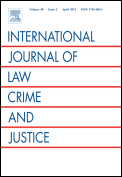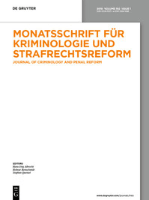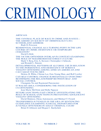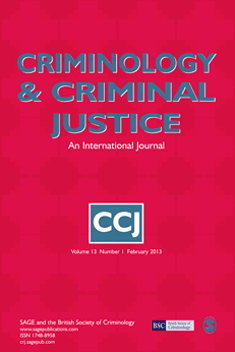
International Journal of Law Crime and Justice
Scope & Guideline
Illuminating Contemporary Challenges in Law and Crime
Introduction
Aims and Scopes
- Interdisciplinary Research on Law and Justice:
The journal integrates perspectives from law, sociology, psychology, and criminology, encouraging research that examines the complexities of legal systems and their interactions with societal norms. - Empirical Studies and Quantitative Analyses:
A significant focus is placed on empirical research, utilizing quantitative methodologies to analyze crime trends, victimization patterns, and the efficacy of law enforcement strategies. - Human Rights and Social Justice Issues:
Research often addresses the intersection of law enforcement practices with human rights, exploring issues such as police violence, discrimination, and the impact of legal frameworks on marginalized communities. - Global Perspectives on Crime and Justice:
The journal emphasizes cross-cultural studies and comparative analyses, allowing for a broader understanding of crime and justice systems worldwide. - Policy Evaluation and Reform:
There is a strong emphasis on evaluating existing policies and recommending reforms based on research findings, particularly in areas such as policing practices, sentencing, and rehabilitation.
Trending and Emerging
- Impact of Technology on Crime:
There is an increasing focus on the implications of technology, such as cybercrime and the use of artificial intelligence in law enforcement, reflecting the growing relevance of digital issues in contemporary justice. - Social Media and Crime Dynamics:
Research exploring the role of social media in shaping public perceptions of crime, mob justice, and community responses has gained traction, highlighting the influence of digital platforms on societal attitudes. - COVID-19 and Justice Responses:
Papers examining the impact of the COVID-19 pandemic on policing, crime rates, and legal proceedings are emerging, indicating a significant area of inquiry into how global crises affect justice systems. - Community-Based and Restorative Justice Models:
There is a rising interest in community-led initiatives and restorative justice practices, emphasizing alternative approaches to traditional punitive measures in criminal justice. - Intersectionality in Crime and Justice Studies:
The journal is increasingly publishing studies that incorporate intersectional analysis, examining how various social categories such as race, gender, and class intersect to influence experiences of crime and justice.
Declining or Waning
- Traditional Crime Theories:
The journal has seen a decrease in publications focused on traditional criminological theories, such as strain theory or routine activity theory, as researchers shift towards more contemporary issues like cybercrime and social media influences. - General Crime Statistics Reporting:
There is a noticeable decline in papers solely focused on the reporting of general crime statistics, with more emphasis now placed on qualitative analyses and case studies that provide deeper insights into specific issues. - Localized Studies without Comparative Contexts:
Research that focuses exclusively on localized crime issues without a comparative or global context appears to be waning, as the journal increasingly favors studies that draw connections across different legal and cultural frameworks. - Focus on Adult Criminal Justice Systems Only:
There is a shift away from research solely focused on adult criminal justice systems, with more attention being given to juvenile justice, rehabilitation, and alternative justice models. - Static Views on Crime Prevention:
The journal is moving away from static views on crime prevention strategies, favoring dynamic discussions that incorporate technology, community engagement, and evolving societal norms.
Similar Journals

Salus Journal
Advancing Health Sciences Through Open DialogueSalus Journal, published by Charles Sturt University, is an esteemed open-access journal dedicated to advancing the field of health sciences. Established in 2013, this journal emphasizes the dissemination of innovative research and critical analyses that influence evidence-based practices in healthcare and wellness. With its commitment to making high-quality research accessible to a global audience, Salus Journal plays a crucial role in fostering academic collaboration and dialogue among researchers, professionals, and students alike. Its focus on interdisciplinary approaches encourages contributions across various domains of health, ensuring that it remains a vital resource for the community. The journal is easily accessible online, promoting the visibility and impact of published works. For more information and to stay updated with the latest research in health sciences, visit their website and explore the wealth of knowledge available.

Monatsschrift fur Kriminologie und Strafrechtsreform
Pioneering Discussions in Crime and Legislation.Monatsschrift für Kriminologie und Strafrechtsreform is a prestigious academic journal dedicated to advancing the fields of criminology and legal reform. Published by WALTER DE GRUYTER GMBH in Germany, this journal boasts a significant history since its inception in 1943, continually evolving its focus and scope from 2010 to 2024 to address contemporary issues in law and criminal justice. With an impressive Q2 rating in Law and a ranking in the 46th percentile among social sciences law journals, it serves as a vital resource for researchers, practitioners, and students alike. By publishing innovative articles, critical reviews, and comprehensive studies, the journal aims to foster academic discourse and propel discussions surrounding legislative reforms and criminological theories. Although it does not currently offer open access, readers can obtain valuable insights that contribute to both academic scholarship and practical applications in the legal field, thereby enhancing the understanding of complex societal dynamics related to crime and law enforcement.

CRIMINOLOGY
Unveiling Insights into Crime and Justice.CRIMINOLOGY, published by WILEY, stands as a leading journal in the fields of Law and Forensic Medicine, with an impressive impact factor that places it in the Q1 quartile for both categories. With its ISSN 0011-1384 and E-ISSN 1745-9125, this esteemed journal has been at the forefront of advancing knowledge and understanding in criminological theories and practices since its inception in 1963, and continues to be relevant through 2024. As of 2023, CRIMINOLOGY is ranked #19 in Social Sciences_ Law and #19 in Medicine_ Pathology and Forensic Medicine, positioning it within the top 2% of its field, making it an essential resource for researchers and professionals alike. Despite not offering open access, it provides invaluable insights into the complexities of crime, law enforcement, and societal impacts, thus shaping the future of criminological research and policy.

Journal of Criminal Psychology
Transforming criminal justice practices through psychological innovation.Journal of Criminal Psychology, an esteemed publication by EMERALD GROUP PUBLISHING LTD, serves as a pivotal resource in the interdisciplinary study of criminal behavior through the lenses of psychology and law. Since its inception in 2011, this journal has significantly contributed to the understanding of psychological principles as they apply to crime, law enforcement, and social justice, making it a vital source for both researchers and practitioners. With a commendable ranking of Q1 in Law and Q3 in Applied and Social Psychology for 2023, the journal guarantees high-quality research findings that can influence policy and practice across these domains. Although it does not offer open access, its rigorous peer-review process ensures that every published article adheres to the highest academic standards. The Journal of Criminal Psychology not only fosters academic discourse but also drives innovation in criminal justice practices, making it essential reading for anyone dedicated to the enhancement of ethical standards in legislation and law enforcement.

Criminology & Criminal Justice
Shaping the Future of Criminology and Criminal JusticeCriminology & Criminal Justice is a leading academic journal published by SAGE Publications Ltd that serves as an essential resource for scholars, practitioners, and students in the field of criminology and legal studies. With its ISSN 1748-8958 and E-ISSN 1748-8966, this journal has established itself as a crucial platform for innovative research, analysis, and discourse, consistently maintaining a prestigious Q1 ranking in Law. Spanning a diverse range of topics within criminology and criminal justice, it promotes interdisciplinary perspectives that reflect current trends and challenges within the domain. With a notable 93rd percentile ranking in Scopus, the journal ensures that its publications meet rigorous academic standards, fostering the advancement of knowledge and practice in the field. Based in the United Kingdom and catering to a global audience, this journal enhances scholarly communication and collaboration, making it an indispensable tool for those dedicated to unraveling the complexities of crime and justice.

PSYCHOLOGY CRIME & LAW
Decoding Criminal Minds: Insights for Law and SocietyPSYCHOLOGY CRIME & LAW, published by Routledge Journals, Taylor & Francis Ltd, is a premier academic journal dedicated to the intersection of psychology, criminology, and the law. With an ISSN of 1068-316X and an E-ISSN of 1477-2744, this journal provides a critical platform for the dissemination of cutting-edge research and innovative methodologies in the fields of psychology, forensic medicine, and legal studies. Spanning over three decades (1994 to 2024), it holds impressive Scopus rankings, placing it in Q1 and Q2 quartiles for its contributions to law and forensic medicine, highlighting its standing within the academic community. PSYCHOLOGY CRIME & LAW is particularly noted for addressing contemporary issues at the crossroads of human behavior and legal standards, making it essential reading for scholars, practitioners, and students alike. While the journal is not open access, it offers valuable insights into a variety of topics, from criminal psychology to the implications of mental health in legal contexts, ensuring that it remains an influential resource for those engaged in research and professional practice.

Asian Journal of Criminology
Unraveling the Complexities of Crime in the Asian ContextAsian Journal of Criminology, published by SPRINGER, stands as a pivotal platform for scholarly communication within the field of criminology, boasting a notable impact factor and achieving a distinguished Q1 ranking in Law for 2023. Located in the Netherlands, this journal addresses the complexities of crime and justice in Asian contexts, fostering interdisciplinary discourse between researchers, practitioners, and policymakers. Since its inception in 2006 and continuing through to 2024, the journal has published a range of high-quality articles that explore theoretical frameworks, empirical research, and practical applications in criminology. Although the journal is not open access, it remains accessible through academic libraries and institutions, ensuring its wide reach among scholars and students. With a Scopus ranking of 143 out of 1025 in the field of Social Sciences Law, placing it in the 86th percentile, the Asian Journal of Criminology is essential for anyone looking to stay at the forefront of criminological research and its application in diverse societal contexts.

JOURNAL OF QUANTITATIVE CRIMINOLOGY
Innovating Criminological Research with Empirical EvidenceJOURNAL OF QUANTITATIVE CRIMINOLOGY, published by Springer/Plenum Publishers, serves as a premier outlet for cutting-edge research in the fields of law and forensic medicine. With an impressive impact factor and ranked in the top quartile (Q1) of both Law and Pathology and Forensic Medicine categories in 2023, this journal excels in providing empirical analyses and quantitative assessments that address critical issues in criminological research. Since its inception in 1985, the journal has maintained a reputation for excellence, evidenced by its high standing in Scopus rankings—21st out of 1025 in Social Sciences (Law) and 23rd out of 208 in Medicine (Pathology and Forensic Medicine). Although currently not an open access publication, it offers several subscription-based access options to reach a wide array of academics and professionals dedicated to the advancement of criminological and forensic inquiries. Researchers, professionals, and students will find the JOURNAL OF QUANTITATIVE CRIMINOLOGY an invaluable resource, as it fosters interdisciplinary collaboration and methodological rigor in understanding crime and criminal behavior.

Revija za Kriminalistiko in Kriminologijo
Illuminating the Pathways of Crime and SocietyRevija za Kriminalistiko in Kriminologijo is a prominent academic journal dedicated to the fields of criminalistics, criminology, law, and forensic medicine, published by the Ministry of Interior Republic Slovenia. With its inception in 1981, the journal has served as a pivotal platform for disseminating research findings and innovative ideas relevant to crime and justice issues, particularly in the context of Slovenia and the wider region. Despite its current Q4 ranking in various categories, including Law and Pathology & Forensic Medicine, Revija za Kriminalistiko in Kriminologijo remains essential for emerging scholars and professionals seeking to contribute to the discourse in forensic science and social psychology. Although the journal does not offer open access options, it continues to publish rigorous peer-reviewed articles that significantly impact the field, making it a valuable resource for researchers, practitioners, and students alike. Scholars can access the research at the journal's address in Ljubljana, Slovenia, thereby fostering interdisciplinary collaboration and knowledge sharing.

CANADIAN JOURNAL OF CRIMINOLOGY AND CRIMINAL JUSTICE
Bridging Theory and Practice in Criminal JusticeCanadian Journal of Criminology and Criminal Justice is a premier peer-reviewed journal published by University of Toronto Press Inc., focusing on the vibrant fields of criminology and criminal justice. With an ISSN of 1707-7753 and an E-ISSN of 1911-0219, this journal serves as a key platform for interdisciplinary scholarship that aims to advance understanding and improve practices within the field. As a testament to its impact, it is classified in the Q2 quartile for both Law and Social Sciences (miscellaneous) categories as of 2023, reflecting its esteemed position within academic research, ranked #371 out of 1025 in Social Sciences - Law and #290 out of 604 in Social Sciences - Miscellaneous. Spanning from 2003 to 2024, this journal's content encompasses a wide array of topics and contributes to crucial dialogues concerning crime, justice policies, and societal implications. Though it is not an open access journal, researchers, professionals, and students will find a wealth of knowledge that is instrumental for developing impactful criminological studies and informing policy-making in the Canadian context and beyond. Based in Canada at Journals Division, 5201 Dufferin St, Downsview, Toronto, ON M3H 5T8, it stands as an essential resource for those engaged in criminology and criminal justice research.